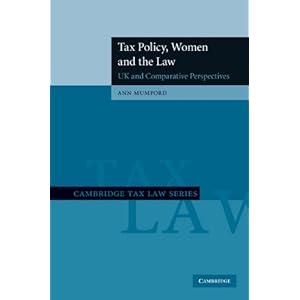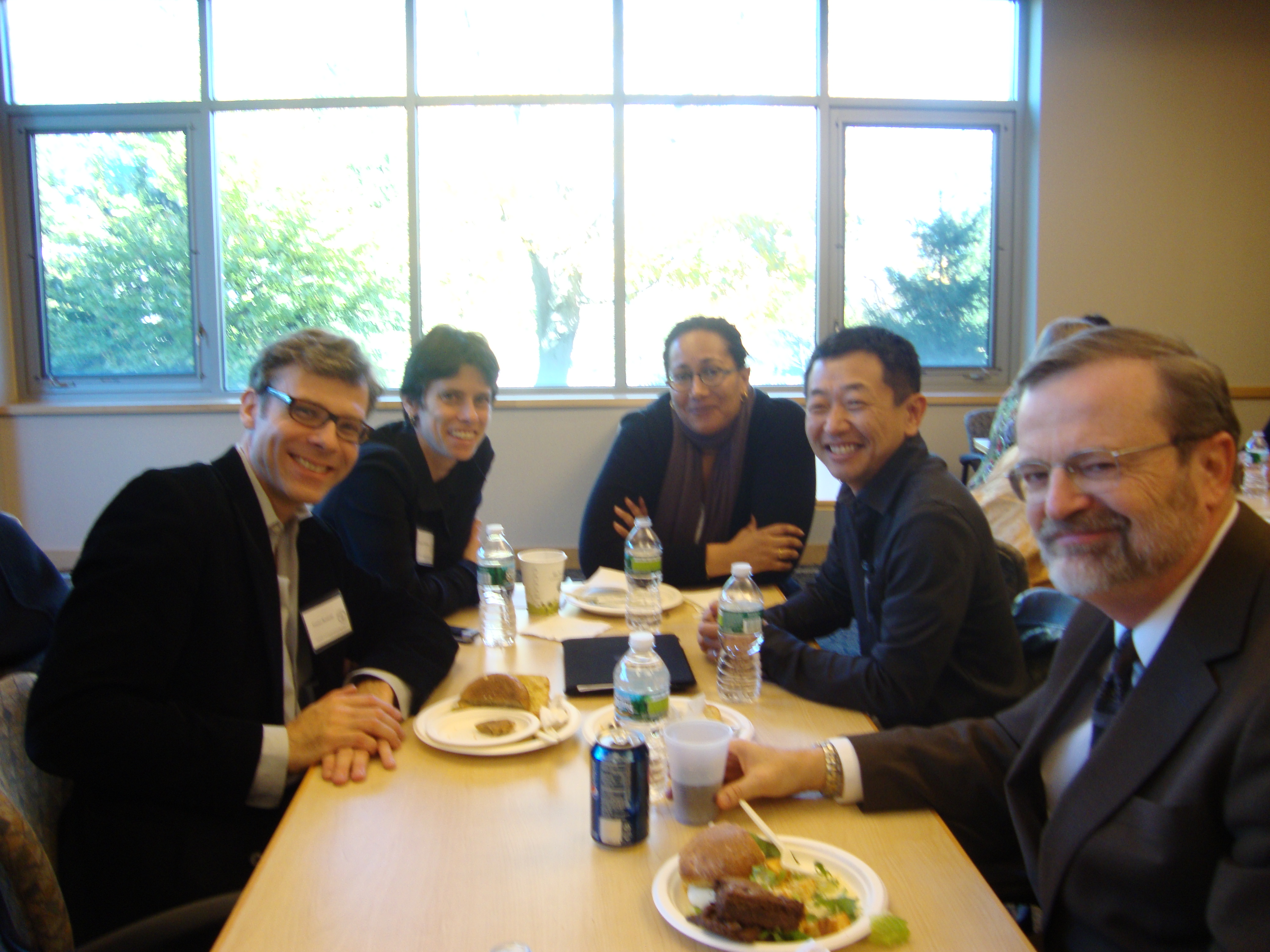In addition to former representative Bob Barr’s interesting address on how his views have evolved on DOMA (the subject of my earlier post here) , the St. John’s U. School of Law Nov. 12th symposium, “Legal, Secular, and Religious Perspectives on Marriage Equality/Marriage Protection/Same-sex Marriage,” brought a number of other notable advocates and scholars to debate marriage equality and analyze the aftermath of the 2008 and 2009 ballot initiative losses for proponents of marriage equality in California, Arkansas, Arizona, Florida and Maine.
Besides Bob Barr, the “pro” side included Yale Law School Professor Ian Ayres discussing his new book, Straightforward: How to Mobilize Heterosexual Support for Gay Rights, as well as a variety of activists and scholars — like Chapman’s Katherine Darmer, UC-Davis’s Courtney Joslin, Thomas Jefferson’s Kaimi Wenger, and UCLA’s Devon Carbado and Russell Robinson. Those opposed to same-sex marriage included Ave Maria Law School’s Jane Adolphe, who insisted that same-sex marriage was “inauthentic” and therefore unworthy of legal protections. The University of Pennsylvania’s Amy Wax, a renowned conservative, sparked a number of negative audience reactions when she revealed that she would be “disappointed” if one of her children came out as gay or lesbian since that would mean that they likely would have to resort to adoption of biologically unrelated children, rather than enjoy what she characterized as the superior experience of natural heterosexual procreation.
I had the privilege of sharing a panel with Maggie Gallagher, founder of the National Organization for Marriage, and perhaps the most prominent opponent of same-sex marriage today. Although I did not agree with almost everything she said, she struck me as more thoughtful and reflective than she has been in other contexts, especially in short media interviews.
Responding to earlier comments about how the Prop 8 supporters’ messages were often misleading and distorting, she said, “I assure you that the arguments that were made by the people who supported Prop 8 believed that they were true. So they were not misleading. They are part of our ongoing disagreement about whether changing the public and legal definition of marriage to include same-sex couples matters.” Of course, Maggie seemed to overlook that it was possible for Prop 8 supporters to have believed their arguments and for those arguments to have been misleading, but I won’t quibble.
Gallagher said, “I too favor marriage equality and I oppose discrimination,” but then clarified that same-sex unions are not marriages and thus “it is not discrimination to treat different things differently.” She added, “I do not think that equality requires the recognition of same-sex unions as marriages.”
According to Gallagher, marriage must be defined as being between a man and a woman because “deeply disconnected societies with not the same religion, economy, ecology — with nothing in common…come up again and again with something that has this basic marriage shape.” She summarized her position in this way:
Marriage as a universal human idea has its roots in three persistent truths about human beings everywhere. The overwhelming majority of us are powerfully attracted, and not without reason, to an act that makes new human life. So newsflash!, sex between men and women makes babies. The second truth is that society needs babies. Reproduction is optional for the individual. Not everybody has to do it. But only those cultures that manage to regulate the procreative implications of male-female sexual attraction survived…. The third idea in which marriage is based is that children ought to have a mother and a father. …Put it this way: when a baby is born there is bound to be a mother somewhere close by, right? If we want fathers to be there for their children, and for the mothers of their children, biology alone is not going to take us very far. We need a cultural mechanism for attaching fathers to the mother-child bond.
Later in her remarks, she added: “Sex makes babies, society needs babies, babies need a mother and father. Out of these truths, an institution arises to try to grapple with a problem to direct human behavior towards the ideal.”
Gallagher’s arguments were not new. They were some of the same arguments resoundingly rejected by a number of courts examining the various justifications for the same-sex marriage prohibitions — most notably the Goodridge decision in Massachusetts and California Federal District Court Judge Vaughn Walker’s opinion in Perry v. Schwarzenegger striking down Prop 8 as unconstitutional.
Gallagher’s arguments also are not hard to refute. I opened my remarks by pointing out that I did not see, and would have liked Maggie to explain, how prohibiting same-sex couples from getting civil marriage protections undermines traditional marriage. Could one not be in favor of both traditional marriage for heterosexuals and civil marriage protections for gays and lesbians for whom a “traditional” marriage is out of the question? And if indeed the crux of her argument is now the protection and well-being of children, how exactly does denying same-sex couples the protections of civil marriage protect the children born to heterosexuals and protect the children born to those same-sex unions? Of course, banning civil same-sex marriage does the exact opposite. It harms children, straight and gay, for no good reason. And it denies the reality that same-sex couples can, and do, procreate, and can, and do, adopt children who would be much better off if their parents were not barred from the many important protections offered by civil marriage.
I also wanted to challenge the circularity of Maggie’s and her anti-marriage equality colleagues’ arguments. At its essence, Maggie’s argument is that same-sex marriage is not marriage because only man-woman marriage is marriage. But why exactly can a same-sex union not ever qualify as a marriage? Because, Maggie argues, marriage is only between a man and a woman. The reality, of course, is that the term “marriage” has been a contested and fluid one throughout history, with many forms of marriage (plural, intergenerational, interracial, homosexual, etc.) either solemnized or marginalized by civil and religious authorities in accordance with the social and cultural dynamics of the respective eras.
Sadly, we were unable to enjoy a true debate during the Q&A portion of our panel because Maggie had to leave early, but it was an interesting exchange nevertheless. Most interesting to me was how Maggie started her remarks with a request of the audience to identify their positions by raising their hands, first if they were supporters of same-sex marriage, and then if they were opponents or were undecided. There were approximately 80 audience members in the moot court room of St. John’s Law School, a Roman Catholic institution. All but 6 or 7 attendees raised their hands in support of marriage equality. About 5 hands went up in opposition. A telling result, surely dispiriting for Maggie and her colleagues, and a very positive harbinger of what lies ahead on the road to universal marriage equality.
-Tony Varona
cross-post from Pam’s House Blend
 Professor Margaret A. Berger (Brooklyn) died last week. A member of the Brooklyn Law School faculty since 1973, Professor Berger was an evidence law expert. Her specialty was scientific evidence, especially DNA. Margaret Berger attended Columbia Law School and had been a member of the New York bar since 1956.
Professor Margaret A. Berger (Brooklyn) died last week. A member of the Brooklyn Law School faculty since 1973, Professor Berger was an evidence law expert. Her specialty was scientific evidence, especially DNA. Margaret Berger attended Columbia Law School and had been a member of the New York bar since 1956.

 The company that makes baggage and passenger screening devices — you know, the “enhanced” scanners at airports — is called
The company that makes baggage and passenger screening devices — you know, the “enhanced” scanners at airports — is called  From the WSJ Law Blog:
From the WSJ Law Blog: The Center invites applications for its RESEARCH ASSOCIATESHIPS for 2011-2012 from scholars and teachers at all levels of the educational system, as well as from artists, community organizers and political activists, both local and international. Associates are provided with offices in our spacious facility, faculty library privileges, and the collegiality of a diverse community of feminists. Research Associate applications are accepted for either a semester or the academic year. The Center supports projects in all disciplines so long as they focus centrally on women or gender. Research Associateships do not provide a stipend. We accept about 15-18 Research Associates per year.
The Center invites applications for its RESEARCH ASSOCIATESHIPS for 2011-2012 from scholars and teachers at all levels of the educational system, as well as from artists, community organizers and political activists, both local and international. Associates are provided with offices in our spacious facility, faculty library privileges, and the collegiality of a diverse community of feminists. Research Associate applications are accepted for either a semester or the academic year. The Center supports projects in all disciplines so long as they focus centrally on women or gender. Research Associateships do not provide a stipend. We accept about 15-18 Research Associates per year. Ann Mumford (Queen Mary, University of London) has published Tax Policy, Women and the Law with
Ann Mumford (Queen Mary, University of London) has published Tax Policy, Women and the Law with  The federal government has no business whatsoever defining social, personal relationships other than those perhaps that relate specifically to an enumerated proper function of the government. For example, [with] the issue of Don’t Ask, Don’t Tell, one can say that at least the issue of homosexual activity or homosexual persons in the military falls within the ambit of a legitimate government concern. [The issue of gays in the military] falls into a very different category than something that ought to be defined as that large universe of policy decisions left by the Tenth Amendment to the people of the states, and that is where the issue of marriage always resided until recent decades.
The federal government has no business whatsoever defining social, personal relationships other than those perhaps that relate specifically to an enumerated proper function of the government. For example, [with] the issue of Don’t Ask, Don’t Tell, one can say that at least the issue of homosexual activity or homosexual persons in the military falls within the ambit of a legitimate government concern. [The issue of gays in the military] falls into a very different category than something that ought to be defined as that large universe of policy decisions left by the Tenth Amendment to the people of the states, and that is where the issue of marriage always resided until recent decades. Here we had a piece of federal legislation that said for federal law purposes only,…this is what marriage means, reflecting the vast majority of Members of Congress representing the vast majority of people in the country at the time in 1996. A lawful union of one man and one woman. Yet what happened is rather than simply provide a shield for purposes of distributing federal moneys pursuant to that definition, the Defense of Marriage Act over the intervening years has been used as a club to force states not to adopt any definition of marriage other than the one that is supposed to apply just for federal law purposes.
Here we had a piece of federal legislation that said for federal law purposes only,…this is what marriage means, reflecting the vast majority of Members of Congress representing the vast majority of people in the country at the time in 1996. A lawful union of one man and one woman. Yet what happened is rather than simply provide a shield for purposes of distributing federal moneys pursuant to that definition, the Defense of Marriage Act over the intervening years has been used as a club to force states not to adopt any definition of marriage other than the one that is supposed to apply just for federal law purposes.
 L to R: Teemu Ruskola, Suzanne Goldberg, Adrienne Davis, Bob Chang, Tom McDonnell
L to R: Teemu Ruskola, Suzanne Goldberg, Adrienne Davis, Bob Chang, Tom McDonnell In this morning’s panel at the “After Gender” Symposium, Adrienne Davis (Wash. U. St. Louis) mentioned an interesting new book — Siobhan Brooks, Unequal Desires: Race and Erotic Capital in the Stripping Industry (SUNY Press 2010).
In this morning’s panel at the “After Gender” Symposium, Adrienne Davis (Wash. U. St. Louis) mentioned an interesting new book — Siobhan Brooks, Unequal Desires: Race and Erotic Capital in the Stripping Industry (SUNY Press 2010). 


 On Wednesay, November 3, 2010 at 6:00 p.m., the New York Public Library’s
On Wednesay, November 3, 2010 at 6:00 p.m., the New York Public Library’s 
 Ann and others previously have offered trenchant criticism of “sexy” Halloween costumes for young girls and women. See, e.g.,
Ann and others previously have offered trenchant criticism of “sexy” Halloween costumes for young girls and women. See, e.g., 


 There is much patriarchy to blame when it comes to breast cancer awareness month. Such as Komen. Komen, as I have
There is much patriarchy to blame when it comes to breast cancer awareness month. Such as Komen. Komen, as I have